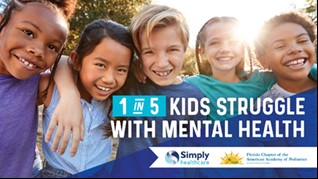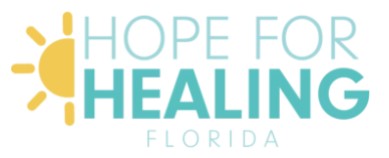It's a New Day in Public Health.
The Florida Department of Health works to protect, promote, and improve the health of all people in Florida through integrated state, county, and community efforts.
Youth Suicide Prevention
Violence and Injury Prevention Section
If you are feeling suicidal or in emotional distress:
Please call or text the Suicide Prevention Lifeline at 988 or reach out through chat by visiting 988lifeline.org/chat. Veterans can call 988 and press 1.

Protective Factors
Simply Healthy Minds
Resources
You Matter Blog
Partnerships/Contact Information
Youth Suicide Prevention
Suicide is preventable for all ages, and groups. Growing up, transitioning through childhood to adulthood, youths can feel their mental health being negatively affected. Learning how to manage and cope with new experiences can lead to feelings of depression, hopelessness and even thoughts of suicide. Youth can feel shame in these feelings and try to hide or cover them up, but often that can create harm and cause their mental health to decline further.
In 2019, according to a Youth Risk Behavior Survey, male and female high school students were asked questions regarding signs of being at risk for suicide.
- 24.2% of the male students and 43.4% of the female students reported feeling sad or hopeless
- 10.9% of the male students and 20.2% of the female students reported seriously considering dying by suicide
- 8.2% of the male students and 15.5% of the female students reported making a plan to die by suicide
- 6% of the male students and 9.6% of the female students reported actually attempting suicide
- 10.5% of the male students and 21% of the female students reported purposefully hurting themselves without wanting to die

Signs and Risk Factors
There are certain behaviors, ways youth express themselves or moods that they display, that can be symptoms of suicidal thoughts. At this age, adults may feel that these behaviors are typical of the teenage years but that is not always the case. It is important to communicate with youth on how they are feeling and to be open with them about whatever they may be experiencing. There is a myth about suicide that asking someone about whether they are suicidal will lead them to act upon those feelings. Research shows that asking someone about it can lead them to get the help that they need. Some signs to watch out for include:
- Marked fall in school performance
- Poor grades in school despite trying very hard
- Severe worry or anxiety, as shown by regular refusal to go to school, go to sleep or take part in activities that are normal for the child's age
- Frequent physical complaints
- Marked changes in sleeping and/or eating habits
- Extreme difficulties in concentrating that get in the way at school or at home
- Sexual acting out
- Depression shown by sustained, prolonged negative mood and attitude, often accompanied by poor appetite, difficulty sleeping or thoughts of death
- Severe mood swings
- Strong worries or anxieties that get in the way of daily life, such as at school or socializing
- Repeated use of alcohol and/or drugs
It is important to know that some youths experience an increased amount of risk. Youths are those who identify as LGBTQ, American Indian/Alaska Native, youth in the child welfare and juvenile justice systems or military service members can have higher incidence of suicidal behavior.
Protective Factors
There are certain factors in all our lives that can act as buffers against circumstances that could harm our mental health. These are called protective factors and they can be found at different levels such as biological, psychological, family or community levels, that lowers the chances of negative mental health outcomes. The list below outlines examples of protective factors at each level.
- Individual Protective Factors
- Positive physical development
- Academic achievement or intellectual development
- High self-esteem
- Emotional self-regulation
- Good coping skills and problem-solving skills
- Engagement and connections in at least two of the following contexts:
- School
- Peer relationships
- Athletics
- Employment
- Religion
- Culture
- Family
- Family provides structure, limits, rules, monitoring, and predictability
- Supportive relationships with family members
- Clear expectations for behaviors and values
- School, Neighborhood and Community
- Presence of mentors and support for development of skills and interest
- Opportunities for engagement within school and community
- Positive norms
- Clear expectations for behavior
- Physical and psychological safety
Simply Healthy Minds

Simply Healthcare Plans and the Florida Chapter of the American Academy of Pediatrics (FCAAP) have resources that you can use to help your child struggling with stress, anxiety, depression, grief, or substance abuse.
They offer a collection of resources and tools that teens, kids, parents, educators, and providers, and community organizations can use to ensure Florida’s kids are in an excellent mental and emotional state.
Learn more by visiting https://www.fcaap.org/posts/news/press-releases/fcaap-and-simply-healthcare-launch-simplyhealthyminds-com/.
Resources
If you are a youth, a parent or educator looking for help, there are resources available. Below you will find tools for how to cope with your mental health, where to find someone to talk to and more.
Tools for Mental Health
- Nemours Foundation provides information for parents, children, teens and educators on emotional and physical wellbeing as well as behavioral concerns.
- Mental Health Literacy organization offering information and resources for parents on different mental illnesses that may affect their teen.
- What Works 4 You is a mental health advocacy group that provides resources for youth struggling with mental health issues like depression, anxiety and suicide.
- www.whatworks4u.org/
- Developed by the American Psychiatric Association and the
American Academy of Child and Adolescent Psychiatry, these resources are for parents whose children have been diagnosed with ADHD, Bipolar Disorder or Depression. - The National Alliance on Mental Health provides resources for family and caregivers on supporting their loved ones managing a mental illness, or experiencing a crisis.
- The National Federation of Families provides resources on mental health to families and youth from a lived experience perspective.
- The JED Foundation provides mental health resources for parents on various mental health topics.
Tools for Suicide Prevention
- The Jason Foundation brings awareness and educational curriculums centered around youth suicide prevention. Provides resources for parents, tools for educators as well as an app for youth.
- From the Society of Preventing Teen Suicide, provides suicide prevention resources for parents.
- The Suicide Prevention Resource Center offers information and resources for parents and teens on risks and warning for suicide.
- A list of state contacts from the Suicide Prevention Resource Center providing information on their suicide prevention plans, legislative updates and more.
- From the National Suicide Prevention Lifeline, provides tools directed to teens and for their parents and support systems on how to get help.
Tools for Suicide Postvention
- After Suicide: A Toolkit for Schools is developed by American Foundation for Suicide Prevention and the Suicide Prevention Resource Center that creates guidelines for comprehensive support programs for individuals bereaved by suicide and promote implementation at the state, territorial, tribal and community levels.
- Postvention Toolkit for parents, educators and children from the HEARD Alliance.
Find help now
- Suicide Prevention Lifeline
- Call or text 988
- Reach out through chat at https://988lifeline.org/chat/
- National Suicide Prevention Lifeline
- 1-800-273-TALK (8255)
- Boys Town National Hotline
- 1-800-448-3000
- Crisis and support line for children, youth and their parents 24/7 and Spanish available
- Trevor Project Lifeline
- 1-866-488-7386
- Provides 24/7 crisis intervention and suicide prevention services to LGBTQ youth
- Find a mental health or substance abuse facility near you
- Find a child & adolescent psychologist or psychiatrist
You Matter Blog

You Matter is a safe space for youth to discuss and share stories about mental health and wellness, created and administered by the National Suicide Prevention Lifeline. You Matter blog posts are written by a rotating Blogger Council of individuals between the ages of 13-24 that are passionate about suicide prevention and mental health.
You Matter is a movement to spread the word that your problems, your worries, your fears, and above all you—unique and real you—matter. And because just about everyone—at some point—hits the wall, we’re here to help.
Partnerships/Contact Information
Florida Department of Children and Families - Statewide Office of Suicide Prevention
2415 North Monroe Street
Tallahassee, FL 32303
850-487-2920
Florida Department of Education - Student Support Services
325 West Gaines Street
Tallahassee, Florida 32399
850-245-7849
Hope for Healing Initiative
*Note: This page contains materials in the Portable Document Format (PDF). The free Adobe Reader may be required to view these files.




Connect with DOH